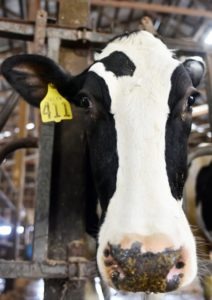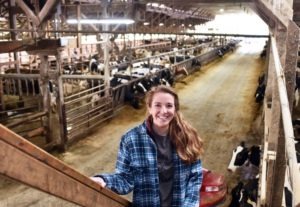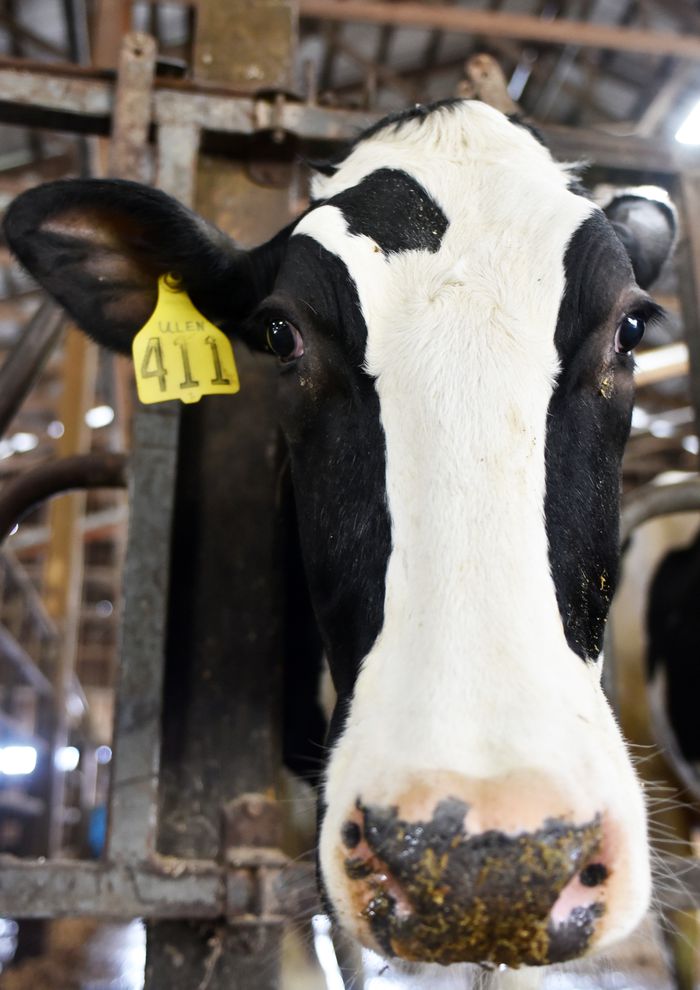 By Jim Kinney | April 5, 2020
By Jim Kinney | April 5, 2020
The Republican
Dairy cattle naturally produce more milk in April than at other times of the year, a phenomenon called the “spring flush” that harkens back to the natural reproductive cycle.
“It’s life as usual on the farm,” said Denise Barstow, a seventh-generation farmer and education and marketing manager at Barstow’s Dairy Store and Bakery and Barstow’s Longview Farm in Hadley. “The cows are healthy and happy.”
But the human population is neither.
The coronavirus and the COVID-19 ailment it causes has shuttered school cafeterias and restaurant kitchens, closing off about half the market for the milk those cows produce, says Doug DiMento, director of corporate communications for Agri-Mark.
The farmer-owned cooperative processes that milk into products like cheese, and, in West Springfield, butter and nonfat powdered milk.
That sea change in who’s buying milk will be felt on farms all across Western Massachusetts that have struggled for years as the price they get doesn’t keep up with the price to produce.
 “This whole thing puts us, puts every system, out of balance,” Barstow said, “including the food system.”
“This whole thing puts us, puts every system, out of balance,” Barstow said, “including the food system.”
The virus has also closed off export markets where about 15% of U.S. dairy products, including much of that powdered milk from the West Springfield plant, are sold.
“We’ve lost millions, millions, in export business,” DiMento said. “It’s hard to put a final dollar figure on it.”
It all adds up to making dairy farming – a tough business under normal circumstance – even tougher.
“It’s going to be a very, very tough year for dairy farmers. A lot of them will not be able to survive this downturn in prices,” DiMento said.
At its root, the predicament is a problem of supply and demand.
“All of the sudden you have an abundance of milk and not a lot of place to put it,” said farmer Robert Fletcher, of Southampton. “The next month or so will be very interesting.”
Fletcher and his family are milking 80 cows now out of a herd of 150. They are diversified, planting a pumpkin patch for fall and selling compost and loam to gardeners and – in a normal year – flowers from a roadside stand at Easter and Mother’s Day.
“Whether we are open for Mother’s Day, I don’t know,” he said.
For Fletcher so far, he’s been able to get all the supplies he needs. Grain dealers have delivered feed, and the replacement parts and service technicians he’s needed are available.
“Everybody thought that the window was a strange option for a farmstead,” she said. “But, oh my gosh, we are so glad we have it now.”
Both the Barstows and the Fletchers are co-op members at Agri-Mark.
DiMento said handlers that process fluid milk, the kind destined for grocery stores and the table, were deluged with orders from supermarkets in the early days of the coronavirus lockdowns. Consumers were then in hoard mode and panic-buying milk and other essentials.
“That seems to have let up now, and orders have returned to normal,” he said
Agri-Mark’s cheese plants are located in Chateaugay, New York, and in Cabot and Middlebury, Vermont. That cheese is sold under the McCadam and Cabot brands.
“And as you can imagine our orders for cheese and butter were through the roof,” he said. “We are making those products as fast as we can.”
Cheese and butter will both keep, and Agri-Mark knows that demand will recede back to normal as consumers realize they’ve built a stockpile.
Agri-Mark shifted office employees in Vermont to the cheese plants to help and suspended manufacture of some sizes and packaging styles in order to focus on its most popular and in-demand items.
The butter makers in West Springfield are also working as fast as they can, according to DiMento. Butter from the plant is also sold under the Cabot brand name.
“We can’t say enough about our employees,” he said. “We’re selling all the butter we can make. We’re making all the butter we can.”
The West Springfield plant has a staff of 120. Employees at the plants are considered essential workers under state restrictions , he said. The plants are not shut down by state stay-at-home orders.
But all that butter and cheese production can’t make up for the loss of commercial kitchens, schools and the export market.
And fluid milk, once produced at the farm, can only hold so long before it spoils. Some processors around the region have already resorted to dumping tractor-trailer loads of milk. That means flushing milk into a farmer’s manure pit simply because there is no other place to put it.
Plants have set capacities, and they won’t process milk that they can’t sell on to retailers. The West Springfield plant is unique in that it makes shelf-stable products that can hold until demand picks up.
“Were working hard at our plant in West Springfield to make sure we don’t dump milk,” DiMento said. “But there is a lot of milk in the marketplace right now.”

